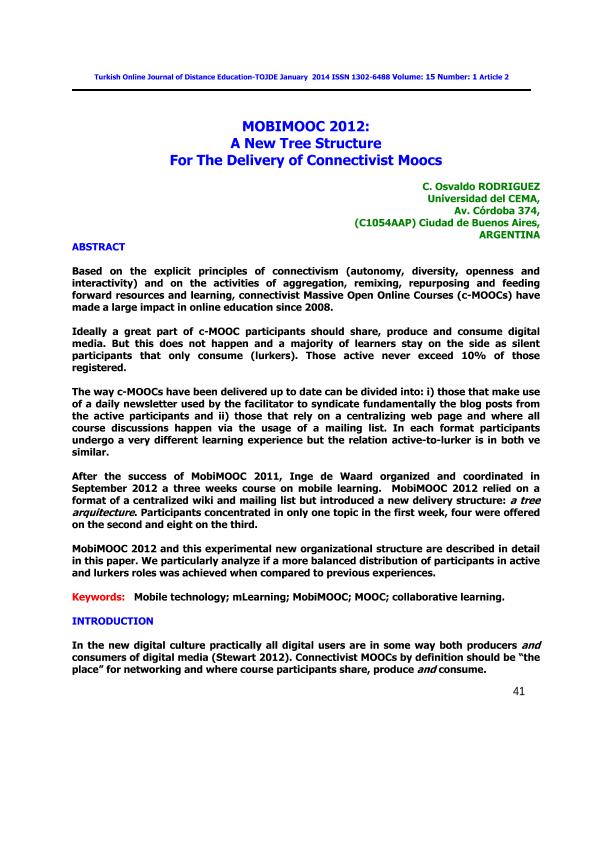Mostrar el registro sencillo del ítem
dc.contributor.author
Rodriguez, Carlos Osvaldo

dc.date.available
2017-10-03T15:40:34Z
dc.date.issued
2014-03
dc.identifier.citation
Rodriguez, Carlos Osvaldo; MobiMOOC 2012: a new tree structure for the delivery of connectivist MOOCs; Anadolu Üniversitesi; Turkish Online Journal of Distance Education; 15; 1; 3-2014; 41-49
dc.identifier.issn
1302-6488
dc.identifier.uri
http://hdl.handle.net/11336/25735
dc.description.abstract
Based on the explicit principles of connectivism (autonomy, diversity, openness and interactivity) and on the activities of aggregation, remixing, repurposing and feeding forward resources and learning, connectivist Massive Open Online Courses (c-MOOCs) have made a large impact in online education since 2008. Ideally a great part of c-MOOC participants should share, produce and consume digital media. But this does not happen and a majority of learners stay on the side as silent participants that only consume (lurkers). Those active never exceed 10% of those registered. The way c-MOOCs have been delivered up to date can be divided into: i) those that make use of a daily newsletter used by the facilitator to syndicate fundamentally the blog posts from the active participants and ii) those that rely on a centralizing web page and where all course discussions happen via the usage of a mailing list. In each format participants undergo a very different learning experience but the relation active-to-lurker is in both very similar. After the success of MobiMOOC 2011, Inge de Waard organized and coordinated in September 2012 a three weeks course on mobile learning. MobiMOOC 2012 relied on a format of a centralized wiki and mailing list but introduced a new delivery structure: a tree arquitecture. Participants concentrated in only one topic in the first week, four were offered on the second and eight on the third. MobiMOOC 2012 and this experimental new organizational structure are described in detail in this paper. We particularly analyze if a more balanced distribution of participants in active and lurkers roles was achieved when compared to previous experiences.
dc.format
application/pdf
dc.language.iso
eng
dc.publisher
Anadolu Üniversitesi
dc.rights
info:eu-repo/semantics/openAccess
dc.rights.uri
https://creativecommons.org/licenses/by-nc-sa/2.5/ar/
dc.subject
Mooc
dc.subject
Mobile Technology
dc.subject
Mobimooc
dc.subject
Mlearning
dc.subject
Collaborative Learning
dc.subject.classification
Otras Ciencias de la Educación

dc.subject.classification
Ciencias de la Educación

dc.subject.classification
CIENCIAS SOCIALES

dc.title
MobiMOOC 2012: a new tree structure for the delivery of connectivist MOOCs
dc.type
info:eu-repo/semantics/article
dc.type
info:ar-repo/semantics/artículo
dc.type
info:eu-repo/semantics/publishedVersion
dc.date.updated
2017-10-02T19:10:48Z
dc.journal.volume
15
dc.journal.number
1
dc.journal.pagination
41-49
dc.journal.pais
Turquía

dc.journal.ciudad
Eskişehir
dc.description.fil
Fil: Rodriguez, Carlos Osvaldo. Universidad del Cema; Argentina. Consejo Nacional de Investigaciones Científicas y Técnicas; Argentina
dc.journal.title
Turkish Online Journal of Distance Education
dc.relation.alternativeid
info:eu-repo/semantics/altIdentifier/url/http://tojde.anadolu.edu.tr/makale_goster.php?id=944
dc.relation.alternativeid
info:eu-repo/semantics/altIdentifier/doi/http://dx.doi.org/10.17718/tojde.59168
dc.relation.alternativeid
info:eu-repo/semantics/altIdentifier/url/http://dergipark.gov.tr/tojde/issue/16891/175928
dc.relation.alternativeid
info:eu-repo/semantics/altIdentifier/url/http://dergipark.ulakbim.gov.tr/tojde/article/view/5000102091
Archivos asociados
